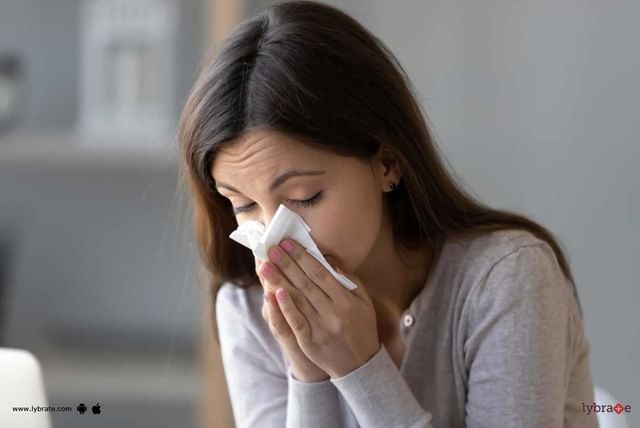Common Cold Allergy - All You Need To Know!
Allergic rhinitis, also known as hay fever, is a type of inflammation in the nose which occurs when the immune system overreacts to allergens in the air. An allergen is something that triggers an allergy. When a person with allergic rhinitis breathes in an allergen such as pollen, mold, animal dander, or dust, the body releases chemicals that cause allergy symptoms.
Signs and symptoms include a runny or stuffy nose, sneezing, red, itchy watery eyes, and swelling around the eyes. coughing, a sore or scratchy throat, itchy eyes, watery eyes, dark circles under the eyes, frequent headaches, eczema-type symptoms, such as having extremely dry, itchy skin that can blister and weep, hives, excessive fatigue. You’ll usually feel one or more of these symptoms immediately after coming into contact with an allergen. Some symptoms, such as recurrent headaches and fatigue, may only happen after long-term exposure to allergens.
Risk factors for allergic rhinitis -
Allergies Can affect anyone, but you’re more likely to develop allergic rhinitis if there is a history of allergies in your family. Having asthma or atopic eczema can also increase your risk of allergic rhinitis.
Some External factors can trigger or worsen this condition, including:
cigarette smoke, chemicals, cold temperatures, humidity, wind, air pollution, hairspray, perfumes, colognes, wood smoke, fumes
Complications of Allergic Rhinitis
Long-term (chronic) allergic rhinitis may cause a number of health problems including:
-
Sinus infections (sinusitis) - Allergic rhinitis can block the tubes that drain the sinuses, leading to infection of the sinus cavities (acute sinusitis). Symptoms include pain in the front of the head and upper face, postnasal drip, stuffy nose, and thick, colored mucus. With a severe sinus infection, you may have a fever and feel sick. Allergic rhinitis can also cause long-lasting (chronic) sinusitis or inflammation of the sinus cavities.
-
Plugged ears, pressure or pain in the ears and ear infections (otitis media) - These can occur when allergic rhinitis affects how much mucus you have in your ears and the eustachian tubes, which run between the inside of the ears and the back of the throat. In children, problems with the eustachian tubes can lead to difficulty hearing.
-
Asthma - Many people have both allergic rhinitis and asthma. If you have an allergy, you are more likely to develop asthma. And for people who already have asthma, allergic rhinitis can cause their asthma symptoms to get worse.
-
Nasal polyps - These are soft, noncancerous (benign) growths that develop on the lining of your nose or sinuses due to chronic inflammation. Small polyps may not cause problems, but larger ones can block the airflow through your nose, making it difficult to breathe.
Prevention
1. Do saline gargles.
2. Whenever possible do steam inhalation also.
3. Cover your nose and mouth with hanky for at least 30sec when you go in dusty areas also when you go in and out of AC. As our noses the most sensitive part of our body, When there is a temperature difference between two rooms or inside and outside, then if we do not protect our nose, it gets affected.
4. Drink Hot Liquids --Hot liquids relieve nasal congestion, prevent dehydration, and soothe the uncomfortably inflamed membranes that line your nose and throat.
5. Sleep With an Extra Pillow Under Your Head-- Elevating your head will help relieve congested nasal passages. If the angle is too awkward, try placing the pillows between the mattress and box springs to create a more gradual slope.
6. Treat That Stuffy Nose With Warm Salt Water--Salt-water rinsing helps break nasal congestion, while also removing virus particles and bacteria from your nose.
7. Blow Your Nose Often (and the Right Way)-- It's Important to blow your nose regularly when you have a cold rather than snorting mucus back into your head. But when you blow hard, pressure can carry germ-carrying phlegm back into your ear passages, causing earache. The best way to blow your nose: Press a finger over one nostril while you blow gently to clear the other.
8. Do not smoke or let other people smoke in your house. Smoking and breathing in other people's smoke will irritate the lining of your nose, eyes, throat and airways, and can make your symptoms worse.
Homeopathy
When it comes to the treatment of allergic rhinitis/cold, Homeopathy is much better at treating the problem. Itis in stark contrast to allopathy, where antiallergic and steroids are used to suppress inflammation. Homeopathic medicines do not aim at just reducing inflammation. They also intend to cure the basic cause of recurrent inflammation. This way, not only the symptoms of rhinitis are treated but the incidence of attacks is reduced/eliminated. It is worthwhile to mention here that all Homeopathic remedies are natural and do not contain any chemicals. That is why these purely natural homeopathic remedies do not have any side effects at all. Here is a list of the top homeopathic medicines for asthma, along with the symptoms when they are used -
- Ars Alb: Thin watery discharge from the nose with irritation and sneezing.Restlessness. Arsenicum is an efficient homeopathic medicine, which treats attacks, which take place after midnight. The patient is anxious, restless, and cannot sleep because of the fear of being suffocated.
- Allium Cepa: Is useful when nasal mucus irritates your nose or upper lip; your eyes are runny but the discharge is bland and non-irritating; you feel worse from warm rooms and better in the open air.
- Natrum Mur: Watery transparent discharge causing blister-like an eruption. Loss of taste or smell.
- Sabadilla: Fluent coryza and violent sneezing, knowing not when will it end. Worse cold.Asthmatic form of rhinitis.
- Euphrasia: Copious burning discharge from the eyes n bland discharge from the nose.
- Bryonia: Nose blocked with congestion in the head. Cannot breathe through the nose. Dry cough with pain in the chest.
- Gelsemium: It is indicated in bland discharge from the nose which is thick. It has sneezing, headache, chilliness in the back and aching pains. The patient is dull n weak
Homeopathy has no side effects and treats the underlying cause. You Should consult a homeopathic practitioner before starting homeopathic treatment for rhinitis.



+1.svg)
